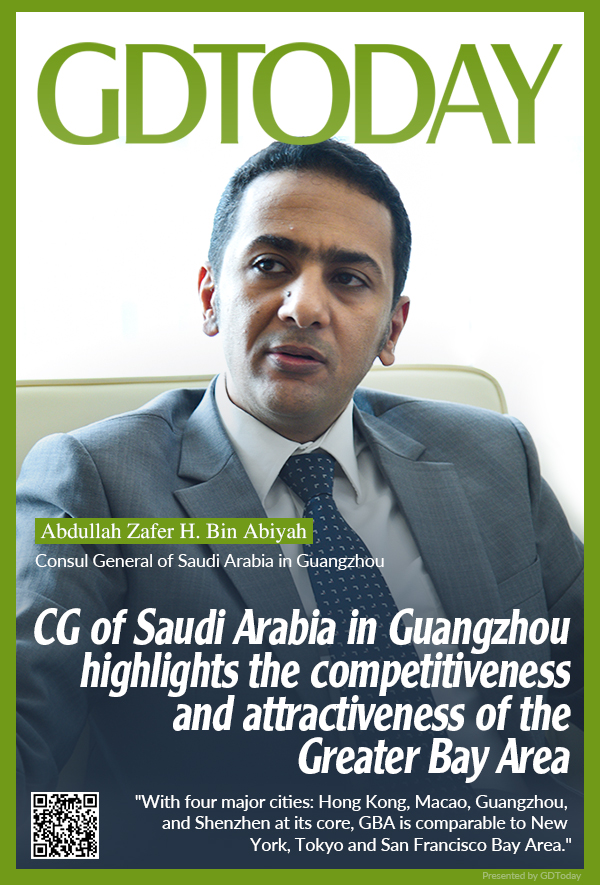Abdullah Zafer H. Bin Abiyah is half a year into his new post as Consul General in Guangzhou. He shared his impressions of Guangdong, insights on the development of the Guangdong-Hong Kong-Macao Greater Bay Area (GBA) and his plans for furthering cooperation with China in a recent interview with GDToday & Newsgd.com.
As a career diplomat, he has previously served at the Saudi Arabian Consulate in Brasilia, Houston, at the Saudi Arabian Embassy to the Republic of Korea and the Consulate office in Geneva.

"It was my first time in Guangzhou", said Abdullah, with a lot of expectations in his eyes.
GDToday: What is your impression of Guangdong Province and its capital city Guangzhou?
Mr. Abiyah: Actually, it was my first time in Guangzhou when I assumed my duty as Consul General here six months ago. After I came here, I found that Guangzhou is a beautiful city, with high-rise buildings, perfect infrastructure, friendly people, clean streets, as well as widespread trees and green vegetation. All of these are very impressive, so I enjoy working and living in Guangzhou very much.
"GBA is comparable to the three major international economic bay areas"
GDToday: The economic and trade partnership between Saudi Arabia and Guangdong is a crucial building block in that of the Sino-Saudi bilateral relationship, so how would you view the importance of the bilateral economic and trade partnership between Saudi Arabia and Guangdong? And what sectors do you care about most?
Mr. Abiyah: As we all know that Saudi Arabia is the largest trading partner of China in the Middle East. And Guangdong is one of the most important trading provinces in China. So, we have established the consulate here to strengthen economic and trade exchanges between Saudi Arabia and Guangdong Province. In addition, we attach great importance to bilateral cooperation between Saudi Arabia and Guangdong in the fields of technology, trade, tourism and industry.
GDToday: What convenience and opportunities can be brought by the GBA construction? In terms of economic and trade cooperation, did Saudi Arabia make any plans to capitalize on opportunities in this area?
Mr. Abiyah: In my opinion, with four major cities: Hong Kong, Macao, Guangzhou, and Shenzhen at its core, GBA is comparable to the three major international economic bay areas of New York, Tokyo, and San Francisco. As engines of GBA development, the four cities have developed coordinated industries. For example, Shenzhen is dominated by electronics, information technology, and financial real estate. Hong Kong’s main industries are finance, real estate, and public utilities. Guangzhou has obvious advantages in automobile manufacturing, medicine and biology, and Macao has been featured with the tourism industry and more industries to be explored.
It is believed that this area will attract more world-renowned companies to enter and invest due to favorable policies and business environment here. For Saudi Arabia, the development of technology and information security in the Greater Bay Area has attracted us a lot.
Our consulate has also been actively contacting and encouraging Saudi companies and entrepreneurs to come to China, especially the Greater Bay Area for further explorations. We hope that there will be more Saudi Arabian entrepreneurs and investors coming here after the epidemic.
GDToday: Could you share some plans on the fields that Saudi Arabia will focus on more in future trade cooperation with the GBA? What will you do to tighten economic ties between Saudi Arabia and GBA during your tenure?
Mr. Abiyah: The cooperation in tourism is one of the sectors that will be more highlighted. There are two reasons. Firstly, Saudi people have gradually shifted their tourist destinations from European and American countries to Asian countries, especially China. Secondly, GBA boasts various tourism resources including beautiful modern urban landscapes, historic relics as well as natural scenery.
And one important part of Saudi Arabia 2030 Vision is to promote and strengthen the economic and trade cooperation between Saudi Arabia and the GBA. The 2030 Vision encourages Saudi entrepreneurs to come to China to communicate and cooperate with outstanding enterprises here in the fields of commerce, real estate investment, etc. These measures promote the establishment of more contacts between Saudi and GBA companies as well as the signing of more cooperation and development agreements.
I will participate in the 21st China International Investment and Trade Fair in Xiamen, Fujian Province later in this week. I will meet and communicate with entrepreneurs from Saudi Arabia and GBA who will attend the fair to help them deepen understandings and find more fields for further cooperation. Besides, our consulate plans to hold more activities to promote exchanges between two sides in the near future.
More concrete cooperation will be seen between the two countries
GDToday: Would you like to introduce some real engagements that have been made recently between China and Saudi Arabia?
Mr. Abiyah: The Ministry of Education of Saudi Arabia and China have also reached an agreement to send Chinese teachers to Saudi Arabia and to introduce Chinese language education into the Saudi education system and incorporate it into the curriculum of all stages of Saudi education, including elementary school and university education. This also reflects the two friendly and cooperative relations between countries.
Reporter| Rofel
Poster| Mia
Editor| Wing, Keane, Jerry Grey